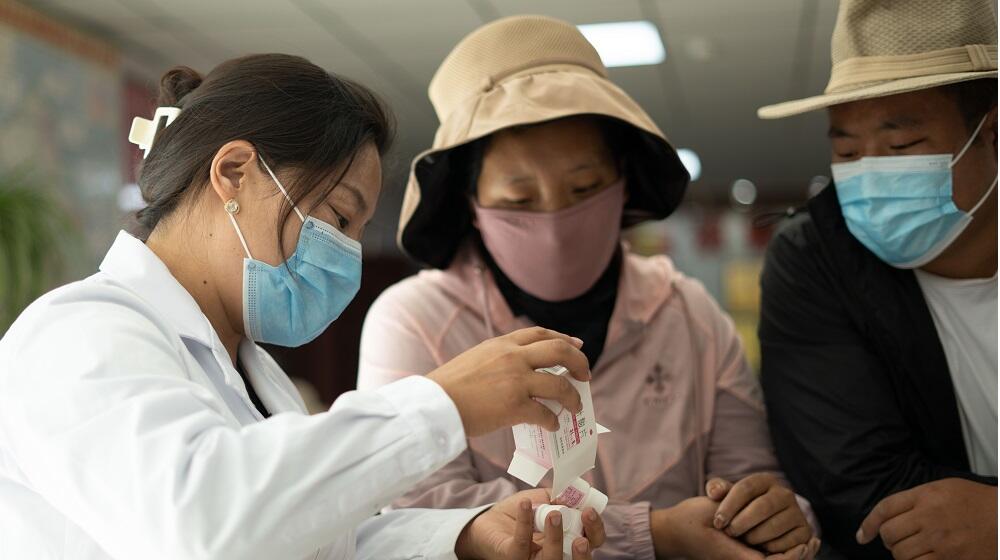BEIJING, China, 13 December 2022 – Women and young people in Qinghai and Shanxi now have better access to sexual and reproductive health and rights, according to the wrap-up meeting of the project “Improving Sexual and Reproductive Health Among Vulnerable Populations in Qinghai and Shanxi”.
Launched in 2019, with funding from the Government of Denmark, the project involved both national and international partners, including the National Health Commission (NHC), China Family Planning Association (CFPA), the United Nations Population Fund (UNFPA), as well as local health and education authorities, women and youth groups, schools and communities.
The project used a multi-sectoral, integrated approach to address the sexual and reproductive health and rights issues of local vulnerable populations, including ethnic minorities with the objective of reducing preventable maternal deaths, increasing informed contraceptive choices, and preventing cervical and breast cancer, HIV/AIDS and sexually transmitted infections.
“Achieving sexual and reproductive health and rights is a core element of the 2030 Sustainable Development Goals. The Outline for Women's Development in China (2021-2030) stipulates that China will further improve women’s reproductive health. We will continue to integrate reproductive health into the life cycle health management process and implement the national essential public health service programme,” said Ms. Song Li, Director General, Department of Women and Children Health, NHC.
“China is still facing the great challenge of regional disparities. The project reached the furthest behind in the ethnic and less developed west and central regions. By disseminating health information, training health workers, providing comprehensive sexuality education, it improved the local populations, especially women and young people’s sexual and reproductive health,” said Mr. Wang Pei’an, Deputy Director of the Population, Resources and Environment Committee of the National Committee of the Chinese People's Political Consultative Conference, Standing Vice President of CFPA.
The project trained 2,100 frontline health service providers and benefited over 90,000 women in local communities. Due to the increase in the quality of local midwifery services, many women now choose to deliver babies locally, while in the past, they only trusted the higher level hospitals, and more women are attending antenatal care visits and being screened for cervical and breast cancer.
The meeting also reflected on the project’s use of innovation and gender- and culturally- sensitive practices.
For the first time, live streaming technology was used in rural schools in Qinghai as a way to deliver high-quality comprehensive sexuality education, reaching more than 1,000 Tibetan adolescents with critical information about their health and well being.
By mobilizing local health workers and advocates, the project also distributed sexual and reproductive health information in Mandarin and Tibetan languages to local adult community members through short videos, mobile applications and in-person communication.
“Working for gender equality and the sexual and reproductive health and rights of women and girls is a long standing priority and the cornerstone of Denmark’s approach to cooperation. This project has addressed many important challenges presented in the Tibetan regions and other places of China, indeed across the world. It is our sincere hope that our small contribution has not only created an impact for the beneficiaries, but also it has enabled and empowered the participating stakeholders to continue making a lasting positive change on an even broader scale, going forward,” said Mr. Kristian Frey Jensen, Counsellor for Political, Economic and Press Affairs, the Danish Embassy to China.
The project is a pilot and its working modality is expected to be scaled up and replicated.
“Our project is coming to an end but I am sure the benefits of it will be lasting and can be built upon in the future. UNFPA looks forward to continuing working with all of you to contribute to the wellbeing of women and young people, especially those left behind in Qinghai and Shanxi,” added Dr. Justine Coulson, Representative of UNFPA in China.
As a follow up to the event, UNFPA, NHC and CFPA will disseminate good practice documentation of the project to more areas in need.
For more information, please contact:
Shujun Liu, Communications Analyst, UNFPA China, sliu@unfpa.org.


